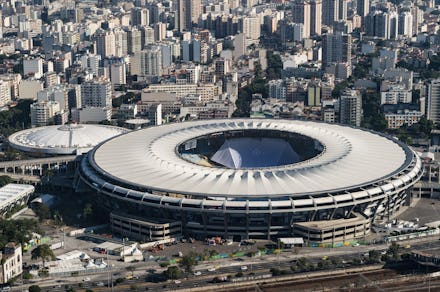The Maracanã Stadium, Venue for the 2016 Rio Olympics, Has a Dark History

The 2016 Summer Olympics in Rio de Janeiro will commence Aug. 5 in the Maracanã Stadium, on the banks of the Maracanã River. The Games' opening and closing ceremonies will take place at Maracanã, as well as the decisive matches of the men's and women's soccer tournaments, according to the Olympics' official website.
Opened in 1950 before the first World Cup since World War II suspended the tournament almost a decade before, the Maracanã Stadium has become an iconic fixture in Brazil — but it's also been marred by controversy.
Maracanã was the world's largest stadium at the time it was built. Before it was packed with record-setting crowds for that year's World Cup, it faced controversy, according to RioOnWatch.com: "Workers died, there was big controversy in the use of public funds, protests, and in fact the stadium was not completed until 1965."
When the stadium opened, it represented the brightest of post-war progress. But after nearly 200,000 devastated fans witnessed the World Cup hosts lose 2-1 to Uruguay in the final in 1950, it sparked a new local slang: Maracanazo. It's still used to express what's known as the saddest day in Brazilian football history and is sometimes compared to the bombing of Hiroshima and even the 9/11 terrorist attacks in terms of its psychological effects on Brazilians, according to CNN.
The stadium underwent modifications in the 1990s, and now holds under 100,000 people, according to Viotar.com. Some say reducing the stadium's capacity to comply with modern FIFA regulations was an exclusive and divisive action, and that it ripped away some of the venue's trademark atmosphere.
"Not only do you lose the numbers of people, but you also make the stadium less egalitarian and more exclusive: ticket prices go up, and divisions within and outside the stadium increase," according to RioOnWatch. "In its new manifestation, it becomes a symbol not of progress, but instead — and paradoxically — cements societal divisions in Brazil's late-capitalist growth."
Though the general architecture is the same, "in its heart, the stadium is worse," the website wrote.
The site was modernized again for the 2014 World Cup, when it hosted seven matches, including the final.
Today, Maracanã Stadium is used for myriad social purposes in Rio — when it's not hosting the Olympic Games, that is. The city's four main soccer teams all play here, including Flamengo and Fluminense, two of its most famous teams, according to RioOnWatch. It also hosts other large-scale events like rock concerts and certain Catholic masses.
It's also a popular tourist destination: Pele, long considered the best player of all time, scored his 1,000 career goal at the stadium, according to History.com. Tours take around an hour and are offered every day of the week.
Tickets to the Olympics Opening Ceremonies cost up to $3,500 each. Those in attendance will join a line, millions long, of those who have descended upon Maracanã to witness history — and this year's Summer Games will provide that history's next chapter.
Read more: